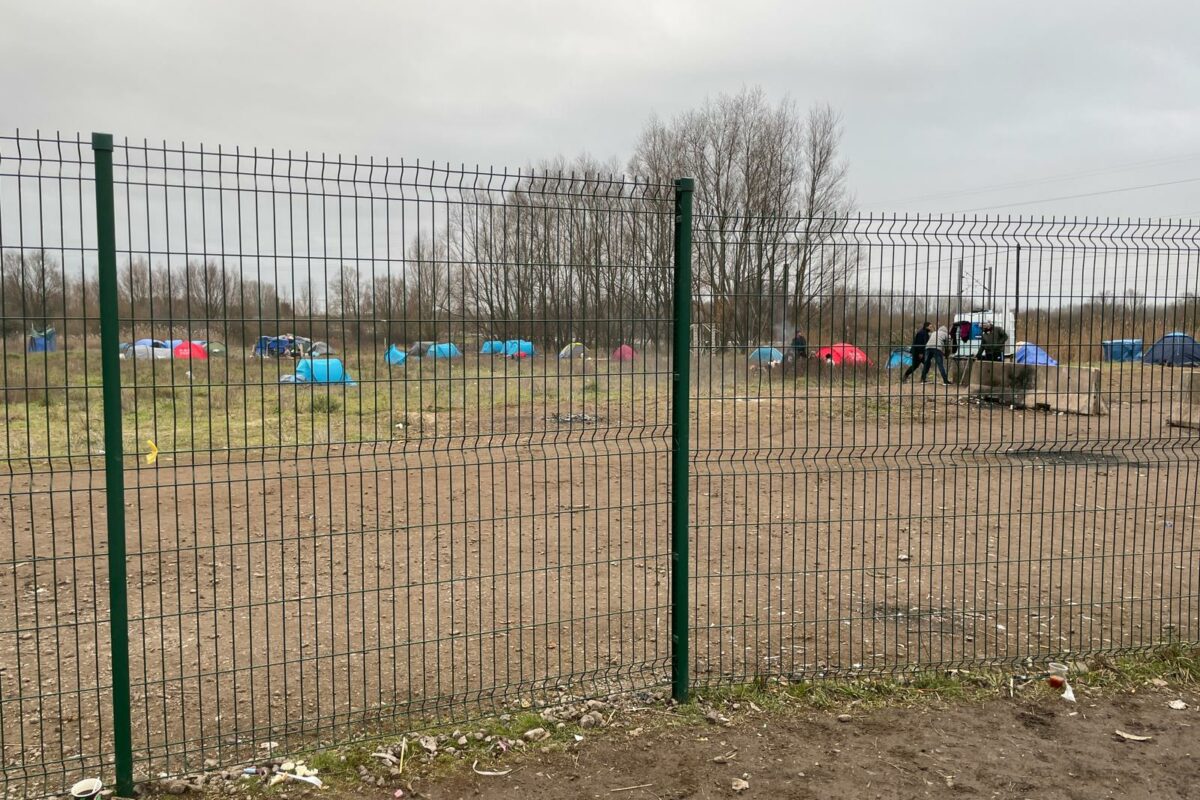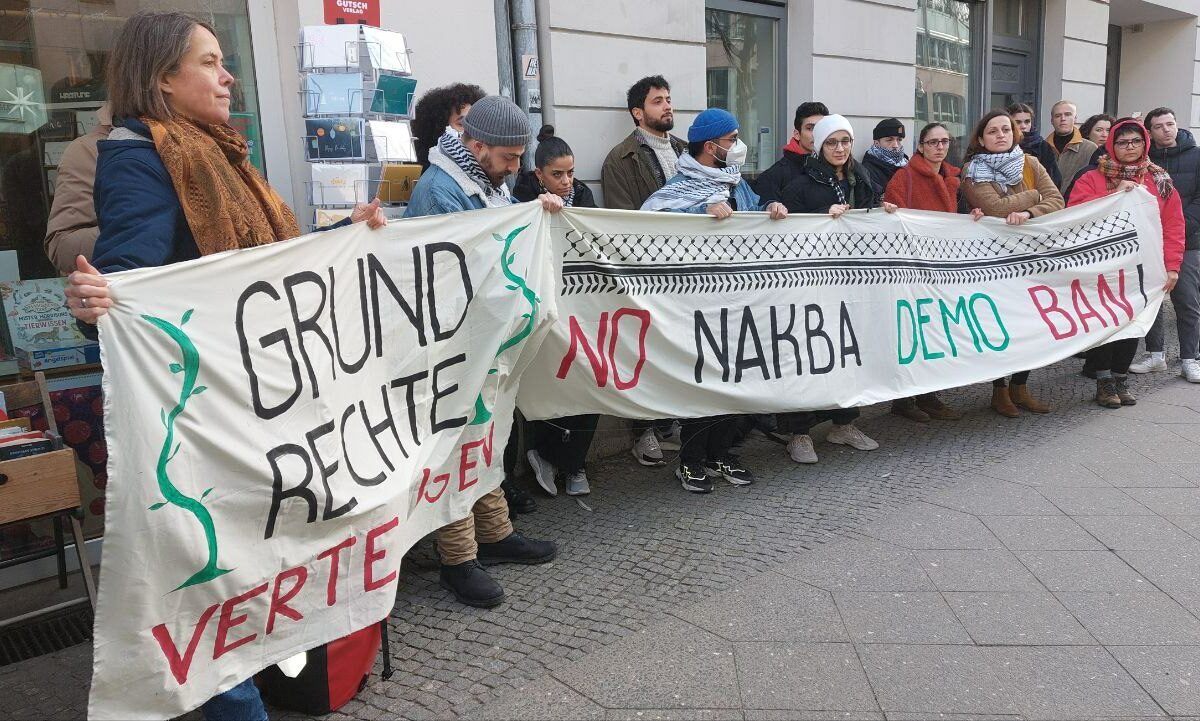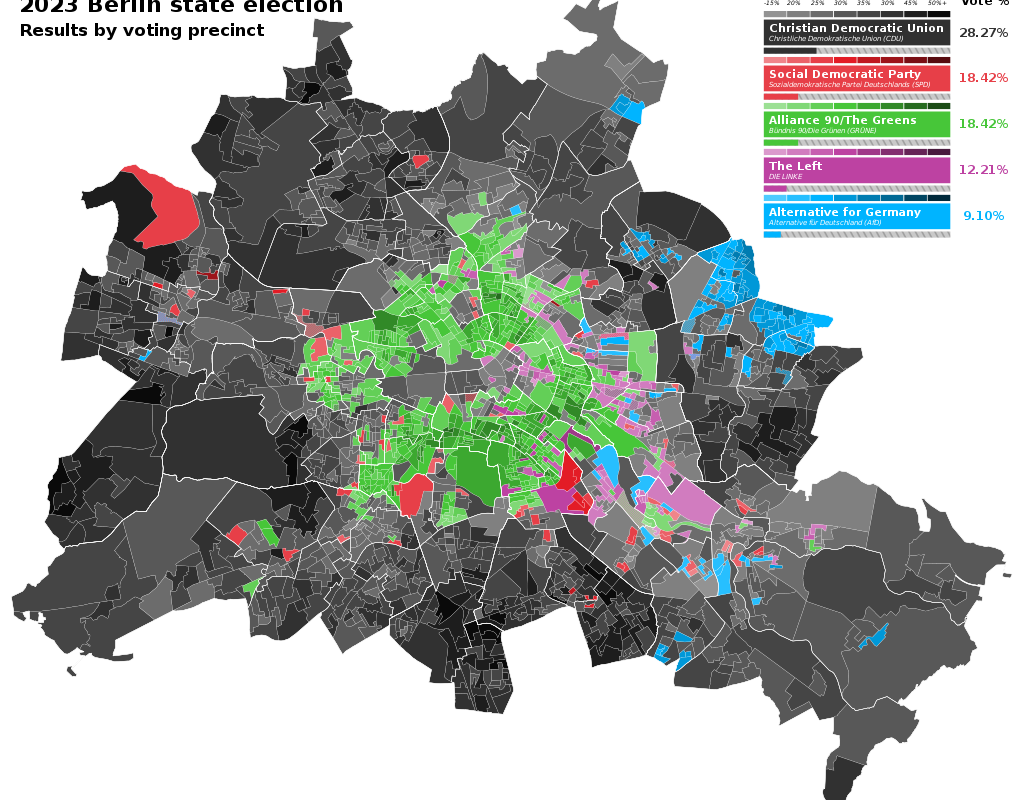This Sunday regional elections were held in Berlin (which is a federal city-state) and in its twelve districts, which exercise the administrative function of municipalities. The Christian-Democratic CDU won with 28.2% (+10.2%) of the vote and 52 seats, 10 points ahead of the SPD and Bündnis 90 (Greens), both with 18.4% (-3% and -0.5% respectively) of the vote and 34 seats (only 105 votes gave second place to the Social Democrats). DIE LINKE (The Left) obtained 12.2% (-1.9%) and 22 seats, while the far-right AfD obtained 9.1% (+1.1%) and 17 seats. The liberal FDP fell below the 5& barrier with 4.6% of the vote (-2.5%) and other parties obtained 9% (-3.4%). The turnout dropped from 75.3% to 63%. In addition, the Christian Democrats won in 9 of the 12 Berlin districts, while the Greens won in the other 3.
The victory of the CDU and Kai Wegner was based on several argumentative pillars: on the one hand, law and order, fed by the events of New Year’s Eve, when tens of thousands of people went onto the streets to “celebrate” the new year with firecrackers, rockets and flash guns, in some cases resulting in attacks on public transport, cars and buildings, as well as on the firemen who tried to put them out, and the police. Immediately all right-wing parties accused criminal immigrants. Later, after dozens of arrests, it was noted that most of the people arrested were German, to which the right wing responded by asking for “the German surnames”, to see if they had roots in migrant families. From there, the story of insecurity, the permissiveness of the left with criminality, the lack of order and the need for a strong hand. One of the CDU’s slogans read: “what criminals will soon hear: arrest warrant”. Another argument was the debate on mobility and car use, under the slogans “Berlin is for everyone, also for drivers” and “Berlin: don’t let them ban the car”.
With the first argument, the CDU has managed to attract potential voters from the extreme-right AfD, which has obtained 9%, a minimal increase compared with the national polls, where it is polling between 15% and 17%. With the issue of mobility, the CDU has also found an enormous reservoir in the voters of the FDP (liberals), who have ended up being expelled from parliament, a probably undesired effect, as the CDU has been deprived of one of its natural allies and its seats have been distributed among three parties of the center-left and two of the right.
To all this is added popular discontent about the elections themselves, which are a repetition of those of 2021 following a sentence of the Constitutional Court, which detected massive failures in the previous vote, such as late opening of polling stations, stations closing for hours due to lack of ballots, ballots in the wrong polling stations (each district has its candidates also for the Berlin chamber) and the publication of results while voting was still going on. The CDU took the opportunity to denounce the chaos generated by the ruling left-wing coalition (SPD, Alliance 90, Left) and especially by the then senator for the Interior, Andreas Geisel.
In this context, the CDU presented itself as the party of order and seriousness. It is also worth mentioning that all these 2023 elections could be invalidated and the status quo of 2021 could return if a challenge to the unconstitutionality of the 2021 elections is successful. This should be resolved in the first week of March. It could result in an acceptance of the 2021 results, in the acceptance of the 2023 results, or in the partial acceptance of some of the 2021 results (for example, some districts without incidents) and some of the 2023 results (where the major incidents occurred).
(Editor’s note: it has since been revealed that during the rerun election, around 450 uncounted voting papers were found in Berlin-Lichtenberg. The chaos could run and run).
For their part, all the parties of the center-left alliance have lost, especially the SPD and its candidate Franziska Giffey. Giffey is a very polarizing person, who had the highest degree of satisfaction among the candidacies, but also the highest degree of hatred (unlike with the other candidates, few people showed indifference). The SPD obtained its worst result ever with 18.4%, only 105 votes more than Jarasch’s Bündnis 90 (Greens). Jarasch herself has burdened a party that is generally on the rise in the rest of Germany and has caused it to lose 0.5% of the votes.
For its part, DIE LINKE. has paid for enter inga government that has not satisfied the demands of the people on the street (the party’s anchor point), especially regarding the referendum on the expropriation of the large real estate companies Deutsche Wohnen & Co. Enteignen, which has not been transferred into law due to the blockage of Mayor Giffey and Senator Geisel, together with the lukewarm attitude of Bündnis 90 and Jarasch, who speak of “not knowing whether it could be carried out in the next few years”.
In addition, the internal fights at the national level between the different factions have led to an enormous loss of militants for the party. It was not for nothing that the Berlin federation tried to distance itself with posters that did not say “DIE LINKE”, but Berliner LINKE (Berlin Left). Candidate Klaus Lederer, despite being one of the most loved and least hated, did not manage to prevent the party from losing 1.9% of the votes and, in the district elections, from losing first place in Lichtenberg, possibly the mayor’s office in Pankow, and three municipal groups in the so-called “outer districts” in the West (Reinickendorf, Spandau and Steglitz-Zehlendorf, each with 2 councilors without a group from now on). Nevertheless, the loss of seats is minimal at the Berlin level, as the seats of the liberals who remain outside are distributed, and yesterday the feeling in the central election party was that “it could have been worse”.
And now what?
In less than 24 hours, all kinds of statements have been made: the CDU claims the Berlin government as the undisputed winner; the SPD is fracturing between part of the party, which after the debacle would not see going into opposition as the worst option, and most of the parliamentary group, which wants Giffey to remain the mayor; Bündnis 90 – The Greens distanced itself from a pact with the CDU during the campaign, but is not ruling out co-governing with a racist party which is opposed to any progress on climate issues. Nonetheless, the Green candidate is still saying that they “would prefer to keep the left-wing alliance”.
Finally, the leadership of DIE LINKE in Berlin would not be unhappy about continuing with the “left” coalition, so as not to give the government to the CDU, despite the enormous skepticism of its basis. Only a clear programmatic turn of the coalition and a written commitment to implement the referendum on the expropriation of large real estate companies within a specific period of time could win confidence for this coalition.
Germany is expecting a hot few months: the anti-war and peace movements seem to be gaining new momentum, the strength of which will be seen on February 25th in Berlin; the unions are threatening strikes, if their conditions for wage improvements are not fulfilled, so as not to lose buying power in relation to inflation. Negotiations are still in progress in the public sector., where the Ver. di and GEW unions are demanding 10.5% wage increases. The DWE housing expropriation referendum, won with 59% of the vote in 2021, believes that its hopes of transposition into law may vanish with a CDU government, and has announced the preparation of a binding referendum, in the midst of an unchecked rise in housing prices.
Finally, the environmental movements have also regained muscle after the events in Lutzerath: the reactivation of the largest open-pit coal mine (by a government of the Greens of Bündnis 90). In this context, a left that loses the pulse of the street to hold on only to the institutions, would be a failed left. That is why the debacle for the center-left and the left in Berlin is a great warning.
Jaime Martinez Porro is the Co-speaker of DIE LINKE Steglitz-Zehlendorf and a member of Izquierda Unida Berlin.




